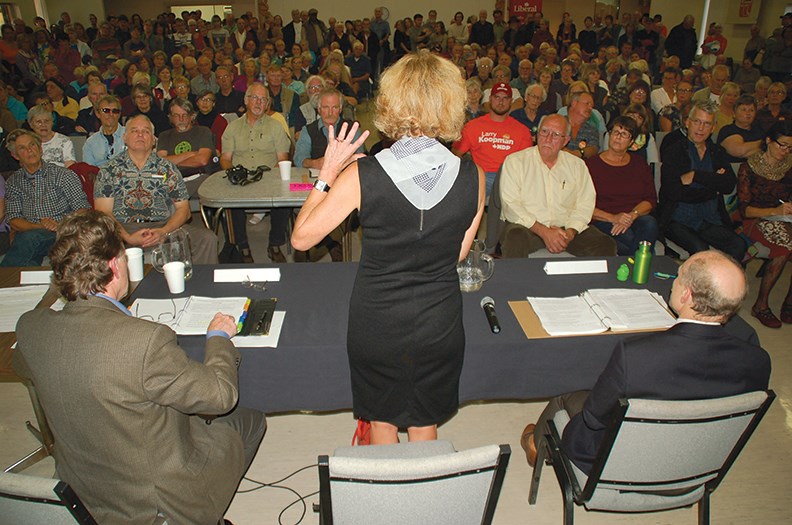Questions about pipelines and tankers, residential schools and legalizing marijuana touched close to home at the Oct. 2 all-candidates meeting sponsored by Alliance 4 Democracy and Sunshine Coast Senior Citizens, held at the Sechelt Indian Band Hall.
About 400 residents attended the two-hour meeting, many having to stand or sit on the floor in order to hear what West Vancouver-Sunshine Coast-Sea to Sky Country MP candidates had to say.
Candidates who showed up to tackle questions were Green Ken Melamed, New Democrat Larry Koopman and Liberal Pam Goldsmith-Jones.
Incumbent Conservative candidate John Weston did not attend the meeting, saying he had a “scheduling conflict.” (See related story.)
On the issue of pipelines and tanker traffic, only Melamed said his party was against it, to loud applause from the audience.
“The Green Party is the only party that is categorically opposed to new investments in fossil fuels,” Melamed said. “We need to move off fossil fuels into the low carbon economy,” he added.
“I’ve got a four-point action plan to stop Woodfibre LNG in its tracks. If elected, when elected MP, that’s my mission – to stop it. Not talk about process because we know where process ends up. Process ends up in approval.”
Goldsmith-Jones said restoring some processes would help ensure that Woodfibre LNG was looked at closely by her party.
“We need to do an audit of the types of legislation across various acts that have been gutted by this government in order to fast-track proposals. That’s going to take a while and then we restore the proper environmental review process,” she said.
“Secondly we need to put a price on carbon. Thirdly we need to provide proper marine safety standards. Fourthly we need to have an open, transparent process.”
Koopman said Melamed had accused the NDP of supporting pipelines and tankers in the past but noted, “We do not support every pipeline and every tanker, by no means.”
He added: “I can not fathom 400 tankers full of heavy bitumen going down Burrard Inlet, around the Coast. It is wrong. It is not right for our community.”
On the topic of legalizing marijuana, Koopman was the only candidate to say his party did not support legalization.
“The New Democratic Party is not in favour of legalization, but we are in support of decriminalization because no one should go to jail for a joint or anything like that,” Koopman said.
“What we need to do is we need to support greater research into the use of marijuana on children and adolescents. I think it’s important.”
Melamed said the “war on drugs is lost” and that by legalizing marijuana his party would be able to pay for some required services in Canada.
“So legalization, taxation on marijuana as we have on tobacco and alcohol, will return about $4.5
billion a year into the coffers and that increases once we move into export. Think of the potential,” Melamed said to loud laughter, cheering and applause.
Goldsmith-Jones noted that legalization of marijuana is something her party is in favour of because it’s something police officers in Canada have been asking for and “it’s time.”
“Having sat as the chair of the West Vancouver police board for six years and going to the national conferences, this is something that police chiefs and police association members have also been asking for,” Goldsmith-Jones said.
“It has been a waste of time and a waste of our tax dollars at that level.”
Goldsmith-Jones also noted regulation would be important because the use of marijuana by youth in Canada is “a public health issue.”
One federal issue brought to the forefront by the Sechelt (shíshálh) Nation leadership is the lack of compensation for day scholars who attended residential school. Coun. Garry Feschuk asked candidates what they would do if elected in regards to compensating day scholars.
Koopman said it was important to acknowledge the “pain and suffering that has occurred to First Nations children and elders and the whole community. With regards to the day scholars, yes they deserve the apology, but much more than that, they deserve reconciliation for the wrongdoings to the day school survivors.”
Melamed said the “era of fighting First Nations in the courts and losing is wasting taxpayers’ money and at the same time insulting the people that have every right to be at
the table.
“The path to justice and healing, reconciliation, begins with accepting the painful truth – that the horrors of the residential school constituted cultural genocide,” Melamed said. “We know that, we accept that, let’s all acknowledge it and then move to the next era where we actually help to give First Nations opportunity.”
“An apology is one thing,” Goldsmith-Jones said, “but actions speak louder than words. And so yes is the answer.”



